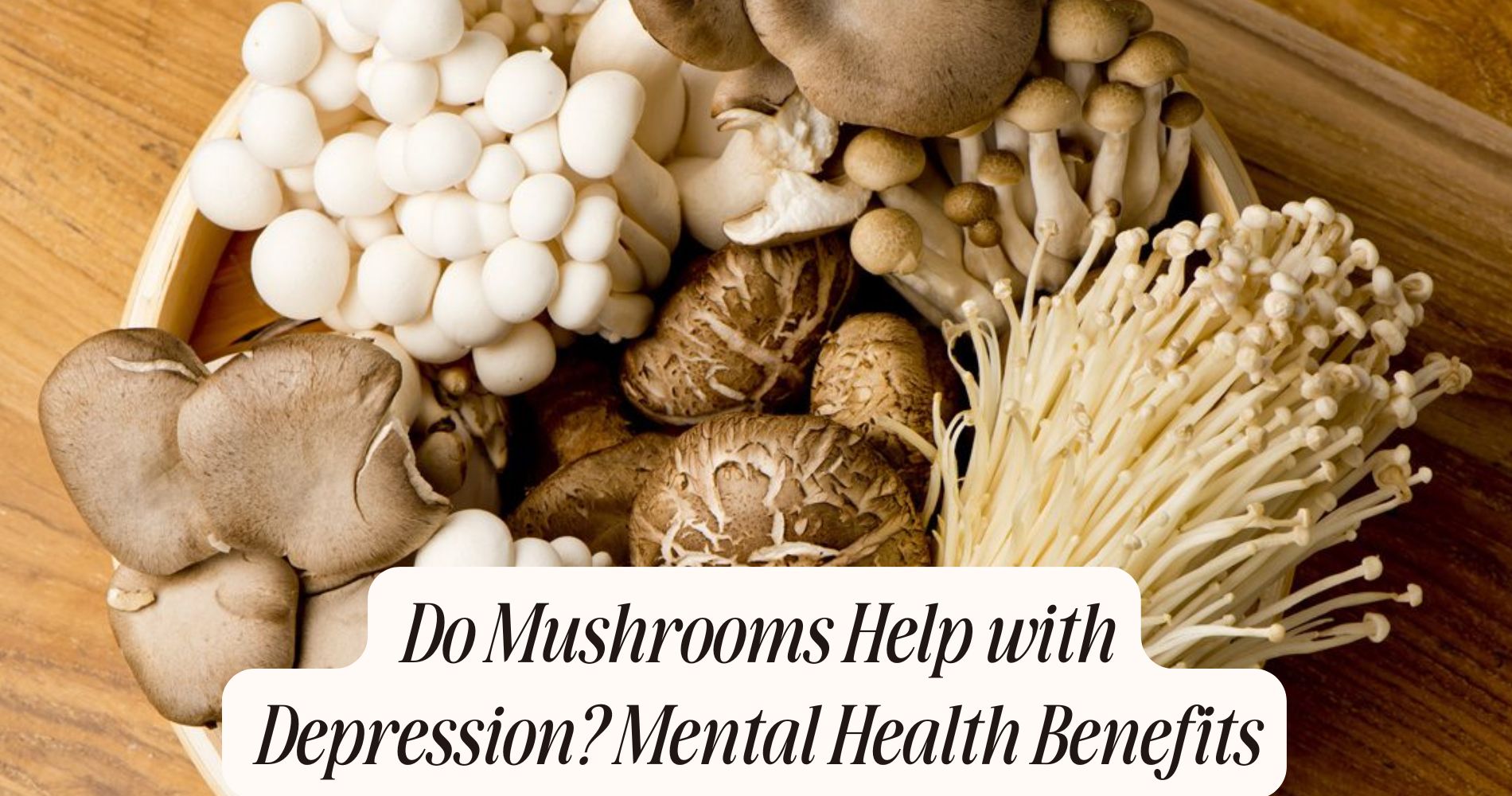
Are Mushrooms OK for Diabetics? Blood Sugar Insights
Are mushrooms ok for diabetics? Mushrooms are a fantastic choice for diabetics. With their low glycemic index, they won't cause rapid blood sugar spikes. Packed with B vitamins, fiber, and antioxidants, they support overall health while maintaining stable blood sugar levels. Incorporating mushrooms into your meals is easy; sauté, grill, or add them to stews for tasty options. Watch out for allergies and avoid high-fat cooking methods. Discover more about how mushrooms can benefit your diabetic diet.
Nutritional Profile of Mushrooms
Mushrooms, often seen as a culinary delight, offer a nutritional profile that's both rich and beneficial. You can explore various mushroom varieties like shiitake, portobello, and cremini, each contributing to a diet with high nutrient density.

Mushrooms are low in calories yet packed with vitamins and minerals, including B vitamins, selenium, and potassium. Their fiber content aids digestion and supports overall health.
Incorporating mushrooms into your meals can enhance your nutritional intake without adding excess calories. Whether you're sautéing them for a side dish or using them as a meat substitute, they provide essential nutrients.
Choosing a mix of mushroom varieties enhances the range of nutrients you receive, making them a versatile and healthy addition to your dining table.
Glycemic Index and Glycemic Load of Mushrooms
When considering dietary choices for managing blood sugar levels, it's important to examine the glycemic index (GI) and glycemic load (GL) of foods.
Mushrooms, in various mushroom varieties, generally have a low glycemic index. This means they won't cause a rapid spike in your blood sugar levels. The glycemic response is minimal, making mushrooms a smart choice for those watching their glucose.
Their low glycemic load further supports this, as it reflects minimal impact on blood sugar even when consumed in larger portions. By integrating mushrooms into your meals, you can enjoy their nutritional benefits without worrying about sharp blood sugar fluctuations.
Always remember to pair them with other low-GI foods for a balanced, diabetes-friendly diet.
Impact of Mushrooms on Blood Sugar Levels
Exploring how mushrooms affect blood sugar levels reveals their potential benefits for those managing diabetes. Various mushroom varieties, like shiitake and portobello, boast low carbohydrate content, which means they've a minimal impact on blood sugar.
When you consume mushrooms, their fiber helps slow down digestion, preventing quick spikes in blood sugar levels. Additionally, mushrooms contain compounds like beta-glucans, which research suggests may improve insulin sensitivity, further aiding blood sugar control.

Incorporating a variety of mushrooms into your diet can provide a nutritious, low-calorie option that supports stable blood sugar levels. However, it's essential to monitor your individual response to different mushroom varieties.
Pairing them with other balanced foods can help maintain overall blood sugar control effectively. Always consult your healthcare provider for personalized advice.
Health Benefits of Mushrooms for Diabetics
Although often overlooked, mushrooms offer several health benefits for diabetics beyond just blood sugar management. Different mushroom varieties, like shiitake, maitake, and portobello, are packed with essential nutrients and antioxidants. These nutrients can help reduce inflammation, a common issue for diabetics, and support overall immune function.
Mushrooms are also low in calories and high in fiber, aiding in weight management, which is vital for diabetes control. Their fiber content promotes healthy digestion and can help you feel fuller longer, reducing the temptation to overeat.
Additionally, certain mushroom varieties contain compounds that may improve insulin sensitivity, making it easier for your body to use insulin effectively.
Incorporating Mushrooms Into a Diabetic Diet
If you're looking to incorporate mushrooms into your diabetic diet, it's easier than you might think. Start by exploring different mushroom varieties like button, shiitake, and portobello. Each offers unique flavors and nutritional benefits.
Mushrooms are low in carbohydrates, making them a smart choice for maintaining balanced blood sugar levels.

Consider versatile cooking methods to keep your meals exciting and healthy. Sauté mushrooms with olive oil, garlic, and herbs for a quick side dish. Add them to soups or stir-fries for extra texture and nutrients.
Grilling portobello caps makes for a delicious meat substitute in sandwiches or salads.
Potential Risks and Considerations for Diabetic Individuals
While mushrooms can be a nutritious addition to a diabetic diet, it's important to be aware of potential risks and considerations.
First, consider mushroom allergies, which can cause reactions like skin rashes or respiratory issues. If you notice any symptoms after consuming mushrooms, consult an allergist for testing.
Another important factor is medication interactions. Some mushrooms, particularly medicinal varieties, may interact with diabetes medications, altering their effectiveness. Always discuss any new dietary additions with your healthcare provider to guarantee they won't disrupt your treatment plan.
Also, be mindful of how mushrooms are prepared. Avoid high-fat cooking methods like frying, as they can affect blood sugar levels.
Opt for steaming or grilling to maintain the health benefits without unnecessary complications.
Boost Your Wellness with SUPER MUSHROOM GUMMIES
Looking for an easy way to enjoy the benefits of mushrooms? Try SUPER MUSHROOM GUMMIES by Well Gummies! Packed with 10 powerful functional mushrooms, these vegan-friendly gummies support calmer energy, sharper focus, and immune health—all in a delicious wild berry flavor. With no jitters or crashes, they’re the perfect way to fuel your brain and body naturally. Ready to experience the benefits? Add them to your daily routine and feel the difference!
Frequently Asked Questions
Can Mushrooms Trigger Allergic Reactions in Diabetics?
Yes, mushrooms can trigger allergies, and if you're diabetic, monitor any unusual symptoms. Mushroom allergies may exacerbate diabetic symptoms. Consult your doctor to determine safe consumption levels and manage potential allergic reactions effectively. Stay informed and cautious.
Are There Specific Mushroom Varieties That Are Better for Diabetics?
When considering specific mushroom varieties, you should know shiitake benefits include immune support, while portobello nutrition offers low-calorie options. Both can fit a diabetic diet due to their low glycemic index and nutrient-rich profiles.
How Do Mushrooms Interact With Diabetes Medications?
You shouldn't worry about mushrooms interacting negatively with diabetes medications. They offer benefits like low calories and high nutrients, supporting diabetes management. Always consult your healthcare provider to verify they're suitable for your specific regimen.
Can Mushrooms Be Included in a Diabetic-Friendly Dessert?
You can include mushrooms in diabetic-friendly desserts. Mushroom dessert recipes offer unique flavors and textures while providing health benefits like low calories and antioxidants. Always check your ingredients to verify they align with your dietary needs.
What Is the Role of Mushrooms in Traditional Medicine for Diabetes?
You'll find mushrooms in traditional medicine for diabetes due to their medicinal properties. They've shown potential in regulating blood sugar levels. Embrace mushroom benefits by incorporating them into your diet, but always consult your healthcare provider first.
Conclusion
Incorporating mushrooms into your diabetic diet can be beneficial due to their low glycemic index and minimal impact on blood sugar levels. They're packed with nutrients and offer numerous health benefits, making them a great addition to your meals. However, always monitor your blood sugar response and consult with your healthcare provider before making dietary changes. By doing so, you can enjoy mushrooms safely and enhance your overall dietary health effectively.




